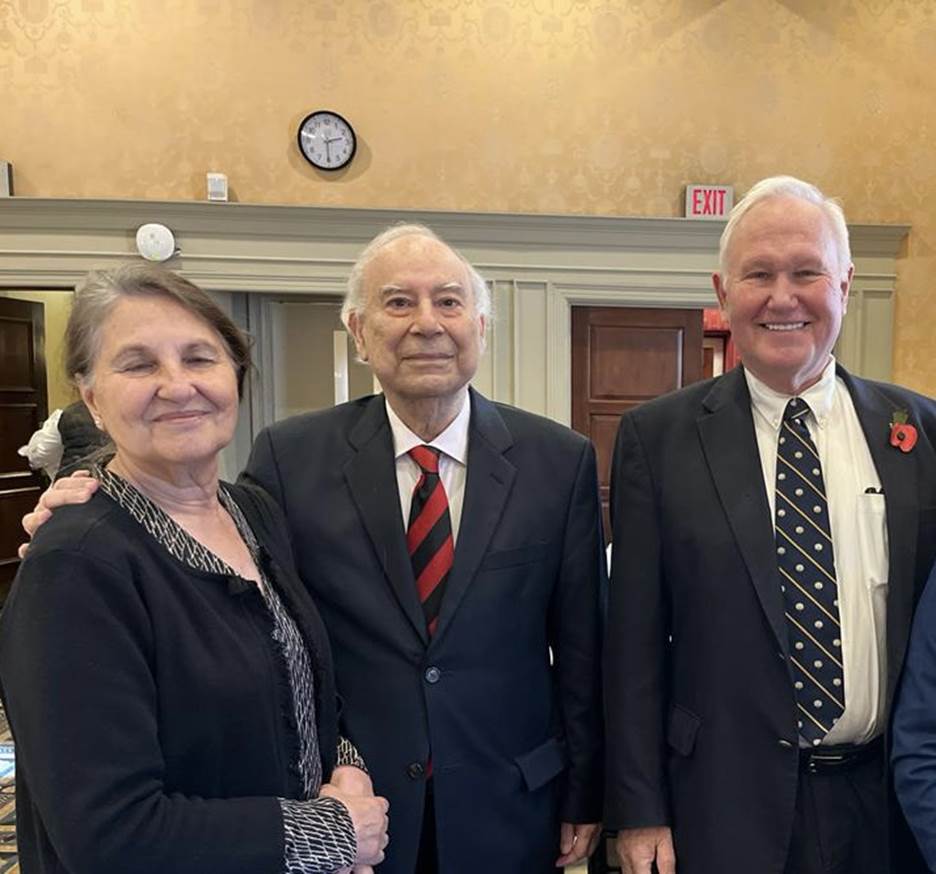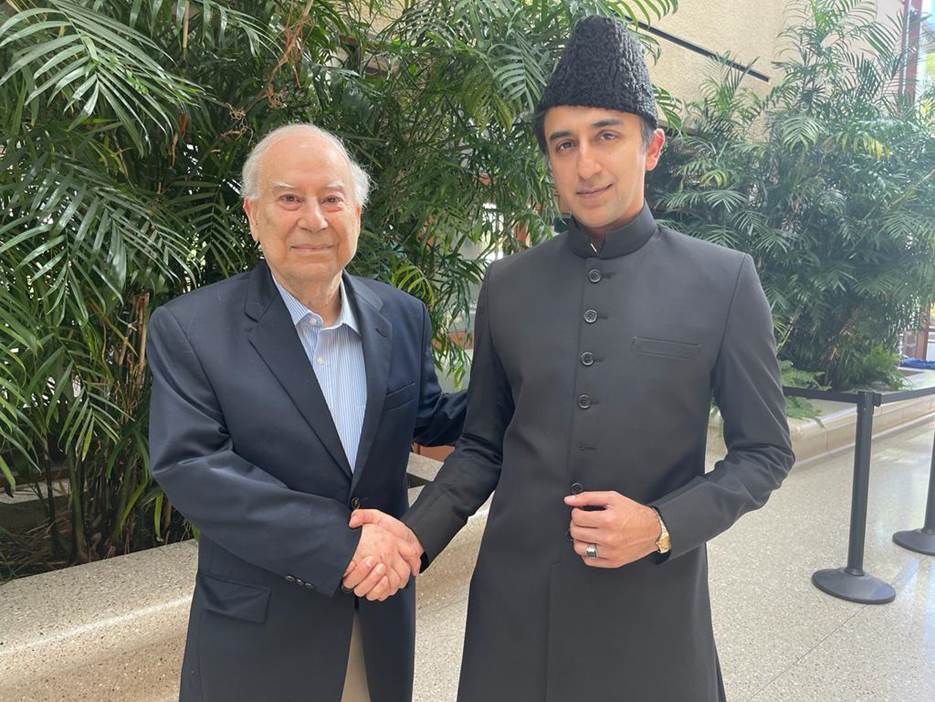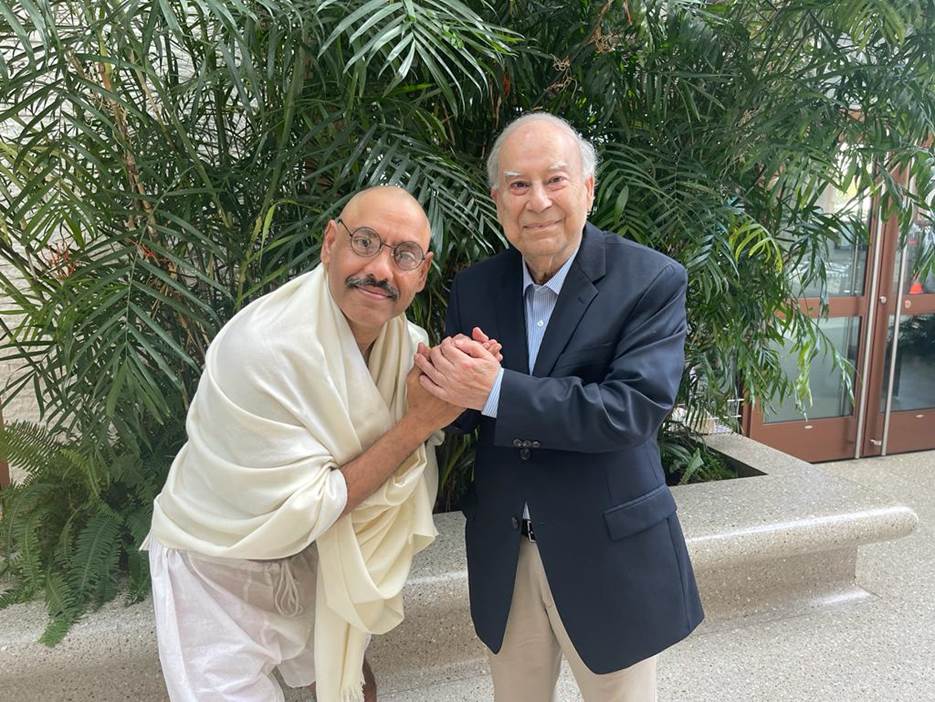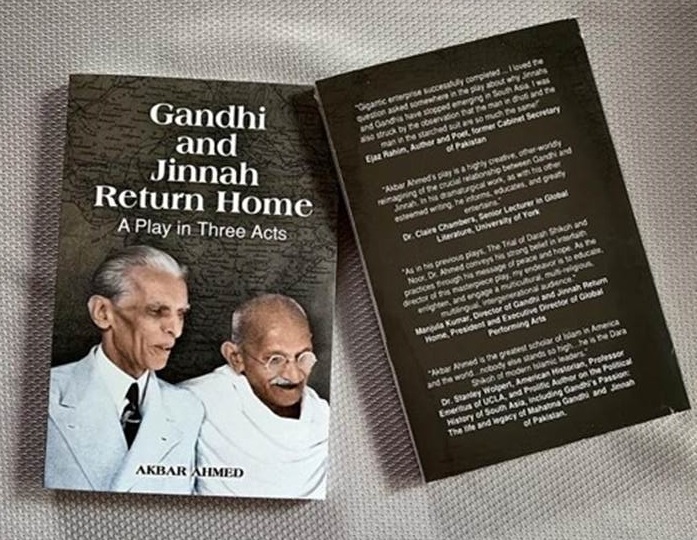
A full house watches the play
Akbar Ahmed’s Play “Gandhi and Jinnah Return Home” at Cosmos Club
By Richard M. Waugaman, MD
Clinical Professor of Psychiatry
Georgetown University School of Medicine

On November 11, a shortened version of Ambassador Akbar Ahmed’s play, “Gandhi and Jinnah Return Home”, was performed in a readers’ theater format at the Cosmos Club in Washington, DC.
This is the third time we have performed one of Ahmed’s splendid plays. Directed by the multi-talented emergency physician-attorney-theater professional Hugh Hill, our cast was enthusiastic about presenting the play to our audience of Club members and guests. Hugh commented that the events of October 7 made the play all the more topical, but “it is in keeping with the Ambassador’s lifelong efforts to help see the multiple facets of Islam, and in this play, Hinduism. He shows with clarity that neither is monolithic, but through profound misunderstandings, each has adherents who are capable of terrible things”—as happened after the 1947 Partition.
The play is especially timely, with religious and ethnic conflicts threatening to spin out of control on a global scale. Terror Management Theory convincingly teaches us that, when afraid for our lives, we are at risk of abandoning democracy and becoming more tribal, as we long for authoritarian leaders who offer the cynical false promise of protecting us against those who are different from us. What actually protects us is greater understanding and tolerance of members of other “tribes.” '

Akbar Ahmed, Zeenat Ahmed and Hugh Hill, Director of the play
We have lost ground since “xenia” was one of the most important social values in ancient Greece, where strangers were welcomed, and a lifelong bond was formed between host and guest.
Shamefully, too many of us non-Muslims equate Islam with terrorists. They tragically get far more news coverage than the vast majority of moderate Muslims. Called “the world’s leading scholar on contemporary Islam” by the BBC, Akbar Ahmed has devoted decades to his scholarly efforts to educate non-Muslims about the exemplary history and ideals of that religion. Author of some two dozen books and director of five films, Akbar has also turned to writing plays, which are especially suited to reaching the hearts and minds of audiences through a collective experience that connects us with the millennia before written language, when poems and epics were sung or recited to audiences by bards.

Akbar Ahmed with Farhan Bhaba playing Mr Jinnah
In “Gandhi and Jinnah Return Home,” the audience has the opportunity to listen to and develop empathy for a range of major and minor characters. In film, close-ups of a character encourage viewers to identify more with that character. In live theater, we always feel closer to the dramatic characters. We may prefer those who most closely articulate our own feelings. Churchill, perhaps, for Westerners. But we then see each character through the eyes of others on the stage. Churchill, in particular, doesn’t fare well in that process. Jinnah and Gandhi begin by rehashing their old disagreements and recriminations. But they, too, develop more and more empathy for each other. And we learn each has long respected the other’s faith tradition.
Larry Franks, after performing the role of Jinnah, said, “Despite a college and post-graduate education, I was barely aware of Jinnah except for some dim recollections from a course I once took in British Colonial History. Western media hasn't done much to keep his memory alive. So, I didn't really have any view of Jinnah. When Hugh cast me in the part, I did some reading, and managed to find a few newsreel clips of Jinnah delivering speeches. After playing his character, I've gained a much deeper insight into some of the complexities of his situation and his responses to the series of challenges and disappointments he confronted while trying to keep alive the ideal of a united, multi-cultural India. In summary, I'd say I have come to view him as the last/best hope for a Muslim leader on the subcontinent who could chart a path towards a peaceful societal evolution.”

Akbar Ahmed with Sri Mirajkar playing Mr Gandhi - a Manjula Kumar production
Most surprisingly for a Western audience, we learned from the play some astonishing facts about pre-colonial India. Few of us realized, for example, that it once boasted a GDP that was 40% of global GDP. Or that centuries of Mughal rule were characterized by exemplary interfaith respect and tolerance. Churchill’s character expressed truly shameful contempt for both Indians and Pakistanis, but his efforts to blame the bloodshed of the Partition on them was transparently dishonest, scapegoating them for the violent legacy of imperial Britain’s cynical divide and conquer strategy.
As a talented playwright, Ahmed uses subtle humor to change the audience’s head and heart. For example, we hear Jinnah complain to his sister about Hindu sexism, followed by Gandhi complaining to his wife about Muslim sexism. Churchill then complained to his wife about the sexism of their “colonial subjects.” The audience laughed appreciatively about his cluelessness about the clever Clementine then offered to order tea for her husband. Westerners are gently forced to confront our maladaptive habit of projecting onto people who are different from us our own prejudices, including our own misogyny.
Although Westerners remember Churchill’s heroic leadership during World War II, we see a deeply flawed man in Churchill’s angry denial of his blatant racism. Ahmed is using theater exactly as Shakespeare described it—holding a mirror up to the audience, so we can see ourselves more objectively, warts and all.
Ahmed depicts a moving reconciliation between the title characters by the play’s end. We only regret that it didn’t take place during their lifetimes. But, like Dicken’s A Christmas Carol, it should motivate us to be agents of reconciliation whenever we can.


